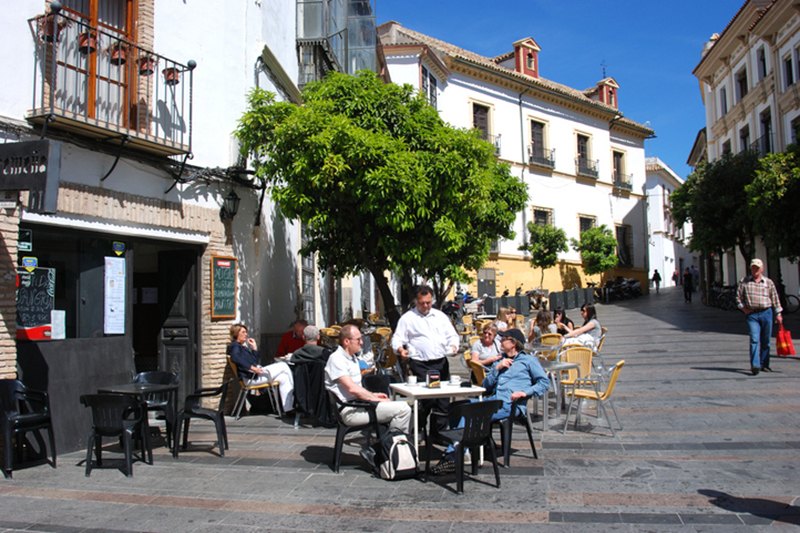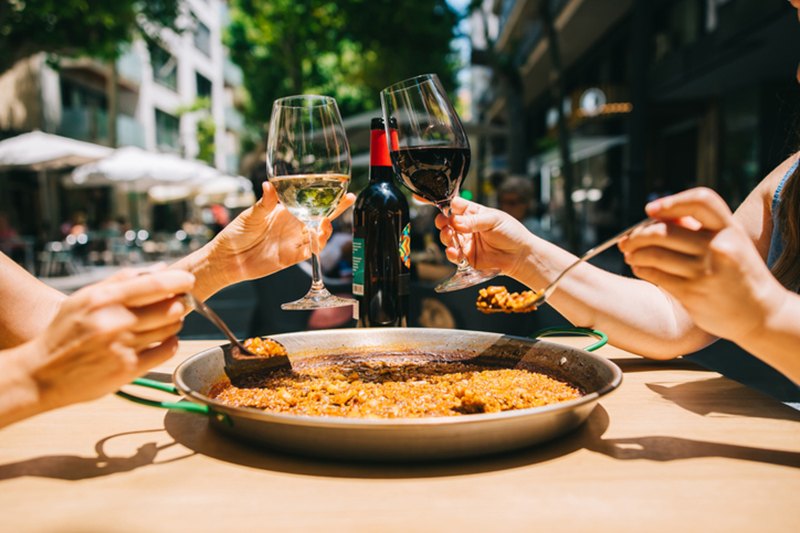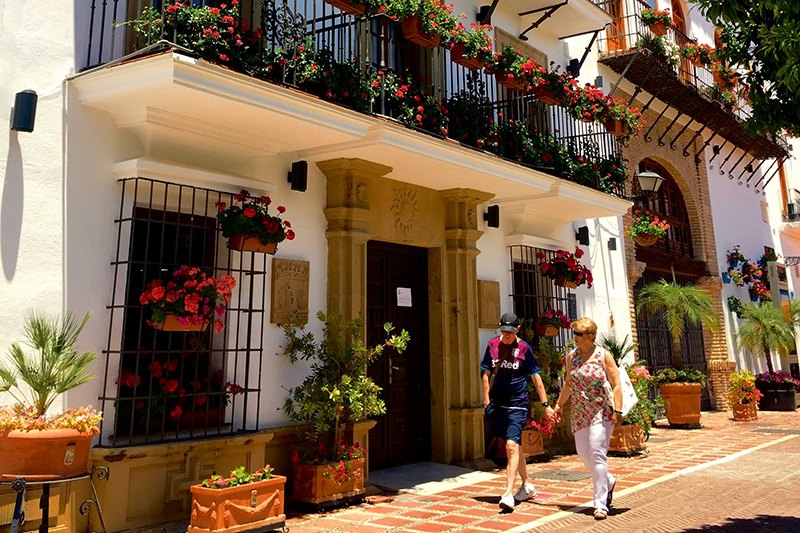
Spanish Etiquette
Alexey | · 11 min. read
Whether you're planning a short vacation, an extended stay, or a permanent move to Marbella, keep in mind that understanding the local customs and Spanish etiquette is essential. This helps avoid misunderstandings and instead creates a smoother, more respectful interaction. The social customs in Spain reflect the country’s vibrant, warm, and welcoming nature.
Spain’s etiquette draws influence from its Roman, Moorish, and Catholic heritage, resulting in a unique cultural fabric. Whether you are exploring the bustling streets of Madrid, soaking up the sun on a Barcelona beach, or wandering through the historical streets of Marbella, knowing the country's etiquette can significantly enhance your experience.
- Table of contents
- The Allure of Marbella: A Blend of History, Culture, and Mediterranean Lifestyle
- Understanding Spanish Etiquette
- The Importance of Learning Spanish Etiquette
- A Guide to Embracing Spanish Culture and Customs
- Final Thoughts: Navigating Spanish Customs Through Etiquette
The Allure of Marbella: A Blend of History, Culture, and Mediterranean Lifestyle
Marbella, situated on the enchanting southern coast of Spain, encapsulates the quintessential Mediterranean lifestyle. This picturesque city, known for its stunning beaches and luxurious resorts, offers a captivating fusion of historical charm and modern vibrancy. With roots tracing back to Roman and Moorish civilizations, Marbella boasts a rich cultural heritage reflected in its architecture, festivals, and traditions.
The lifestyle here is characterized by a laid-back elegance, where outdoor living, exceptional cuisine, and lively social interactions take center stage. For those looking to integrate into the local culture, understanding Spanish etiquette is essential, as it deepens connections with residents and enriches the overall experience.
Marbella's popularity is underscored by its appeal to both tourists and retirees. The city has become one of Spain's top destinations, welcoming over 10 million tourists annually to the Costa del Sol, drawn by its sunny climate and diverse recreational opportunities. Moreover, Marbella is celebrated as one of the best places to live and retire in Spain, attracting many expatriates who appreciate its favorable tax incentives and high quality of life.

Understanding Spanish Etiquette
Key Social Customs:
1. Greetings and Communication
In Spain, greetings are an essential part of social interactions, playing a significant role in setting the tone for both casual and formal encounters. Understanding the nuances of these greetings can greatly enhance your connections with locals.
Common Greeting Practices
- Handshakes: A firm handshake accompanied by direct eye contact is customary in formal settings. This gesture conveys respect and confidence, making it suitable for business meetings or first-time introductions.
- Kisses on the Cheek: Among friends, family, or acquaintances, it is common to greet with two kisses on the cheeks (starting from the right side). This practice symbolizes warmth and familiarity, reinforcing personal connections.
- Use of Titles: Addressing individuals by their last name with a title, such as Señor (Mr.), Señora (Mrs.), or Señorita (Miss), reflects respect. First names are typically reserved for when permission is given.
- Conversational Style: Spaniards are known for their lively and expressive conversations. Engaging with enthusiasm, maintaining eye contact, and using gestures are all appreciated and contribute to a more dynamic interaction.
To truly embrace the local culture and improve your interactions in Marbella, understanding common Spanish greetings and responses is invaluable. For a more comprehensive guide to these essential phrases, you can visit donquijote.org.
2. Mealtime Etiquette
Understanding dining customs in Spain is essential for fully appreciating the culinary experience. Spanish meals transcend mere sustenance; they are vibrant celebrations of culture, community, and connection. By familiarizing yourself with meal structures and accompanying etiquette, you'll enhance your enjoyment and blend in seamlessly with local customs.
Meals in Spain are cherished social events that foster community and relaxation. Embracing these customs is crucial for anyone looking to engage with Spanish society.
Mealtimes
- Breakfast (Desayuno): Typically light, consisting of coffee and pastries.
- Lunch (Comida): The main meal of the day, enjoyed between 2 PM and 4 PM, often featuring multiple courses.
- Dinner (Cena): Served later in the evening, around 9 PM or 10 PM, and generally lighter than lunch.
Table Manners
- Wait for the Host: Always wait for the host to say "Buen provecho" before you begin eating.
- Hand Placement: Keep your hands visible on the table, but avoid resting your elbows.
- Dining Etiquette: Avoid speaking with food in your mouth and use utensils for most foods, including fruits.
3. Business Etiquette
Navigating the business landscape in Spain requires a careful balance of professionalism and personal connection. By respecting Spanish etiquette in business settings, you can foster smoother interactions and build lasting relationships.
Key Aspects of Spanish Business Etiquette
- Punctuality: While Spaniards may exhibit some flexibility with time, it's generally considered polite to arrive on time or slightly early to meetings.
- Meeting Structure: Business meetings typically begin with small talk, helping to create a relaxed and friendly atmosphere conducive to collaboration.
- Communication: Initially, it's advisable to address colleagues using titles and surnames. Transitioning to first names signifies trust and familiarity.
- Dress Code: A conservative approach to business attire is standard. While business casual may be acceptable in some contexts, it's often better to be slightly overdressed than underdressed.
By understanding and respecting these cultural nuances—punctuality, meeting dynamics, communication styles, and appropriate dress codes—you create a welcoming environment that promotes collaboration and trust.
4. Family and Social Gatherings
In Spanish culture, family serves as the backbone of society, fostering a strong sense of community and belonging. Social gatherings are not just occasions for sharing meals; they play a crucial role in strengthening these familial bonds. Understanding the nuances of family values and social etiquette in Spain can enhance your interactions and make you a more considerate guest.
Family Values
- Frequent family gatherings often include extended relatives, highlighting the close-knit nature of Spanish families.
- Elders are highly respected, and their opinions significantly shape family dynamics and decision-making.
Social Etiquette
- Always greet everyone upon arrival and departure, using handshakes or cheek kisses, depending on your familiarity.
- Bringing a small gift, such as wine, flowers, or sweets, is a customary way to show appreciation for your hosts.
- Engage actively in conversations, which may cover a wide range of topics from personal matters to current events.
By embracing these family values and social etiquette, you can navigate social gatherings in Spain with confidence and warmth.
5. Gift-Giving Customs
Gift-giving in Spain is not just a formality; it embodies goodwill, appreciation, and a sense of community. Learning more about the customs surrounding gift-giving can enhance your social interactions and help you navigate various occasions with grace.
Occasions for Gift-Giving
- Gifts are customary during significant events such as birthdays, weddings, and Christmas celebrations.
- In business contexts, gift-giving is less common but can be a thoughtful gesture to express gratitude or goodwill, especially after a successful collaboration.
Choosing the Right Gift
- Focus on quality rather than quantity. Thoughtful options include gourmet foods, fine wines, or luxurious chocolates, which reflect appreciation and consideration.
- It's advisable to avoid overly personal gifts unless you share a close relationship with the recipient.
- Gifts are usually unwrapped in the presence of the giver, enabling immediate expressions of gratitude and creating a sense of warmth and appreciation during the exchange.
6. Dress Code
In Spain, your appearance speaks volumes about your respect for local customs, whether in social or professional settings. Understanding the dress code is essential for blending in seamlessly and making a positive impression.
General Guidelines
- Presentable Attire: Even casual clothing should be neat and well-fitted. Spaniards tend to value a polished look.
- Fashionable Choices: In urban areas, individuals often dress stylishly, reflecting current trends and personal flair.
- Business Attire: Conservative clothing is standard in professional environments, where a formal appearance is expected.
Specific Situations
- Workplace Attire: Opt for formal business attire, such as suits and ties for men or smart dresses and blouses for women.
- Social Gatherings: Smart casual attire is usually appropriate. Men might wear dress shirts and slacks, while women may opt for dresses or tailored outfits.
- Visiting Religious Sites: Modest clothing is a must when entering churches or other places of worship, requiring covered shoulders and knees.

The Importance of Learning Spanish Etiquette
Understanding Spanish etiquette is essential for anyone looking to engage authentically with the local culture. Familiarizing yourself with these customs offers numerous benefits.
Benefits include:
- Avoiding Misunderstandings: Knowledge of local customs can help you navigate social interactions smoothly. For instance, understanding greeting customs, such as the appropriate way to shake hands or give cheek kisses, prevents any unintended faux pas.
- Demonstrating Respect: Showing that you value the local way of life enhances your experiences. When you adhere to Spanish dining etiquette, like waiting for the host to begin eating, you signal appreciation for cultural norms, fostering goodwill.
- Deepening Cultural Insights: Engaging with Spanish etiquette allows you to grasp the values and traditions that shape everyday life in Spain. This deeper understanding can enhance your overall experience and help you appreciate the significance of family and community gatherings.
- Building Authentic Connections: Understanding social protocols—such as the importance of introductions or gift-giving—enables you to connect more meaningfully with locals. This respect often leads to richer interactions, whether in business or social settings.
- Navigating with Confidence: A solid grasp of etiquette empowers you to approach various situations with ease. Knowing how to conduct yourself in formal and informal settings makes a significant difference in how you are perceived.

A Guide to Embracing Spanish Culture and Customs
Understanding and practicing Spanish etiquette can significantly enhance your experience in Spain, whether you are a tourist or a resident.
Here are some effective ways to improve your knowledge of Spanish customs and social norms:
1. Take Local Classes
Enrolling in a language or cultural class can be an excellent way to learn etiquette in context. Many local community centers, universities, and language schools offer courses that include cultural insights alongside language learning. Look for classes that focus specifically on Spanish culture to get tailored information.
2. Read Books and Guides
Numerous books and online resources provide comprehensive insights into Spanish etiquette. Look for titles that cover topics such as dining customs, greeting etiquette, and social interactions. Websites like expatica.com and Spain.info often have guides that outline essential etiquette tips for visitors and newcomers.
3. Engage with Locals
Interacting with Spanish locals can provide invaluable insights into cultural norms. Consider joining local groups or clubs that focus on language exchange or cultural activities. Engaging in conversations will help you practice language skills while learning firsthand about etiquette.
4. Attend Cultural Events
Participating in local festivals, fairs, and community gatherings allows you to observe and practice etiquette in real-time. Events like Feria de Abril in Seville or local tapas tours can immerse you in the culture and provide opportunities to learn from locals.
5. Online Courses and Resources
Several online platforms offer courses on Spanish language and culture. Websites like Coursera (coursera.org) and Udemy (udemy.com) often have specific courses on Spanish etiquette, which can be a convenient way to learn at your own pace. Additionally, YouTube has many channels dedicated to Spanish culture, where you can watch videos that illustrate social customs and etiquette.
6. Practice Common Phrases
Learning key phrases and expressions can help you navigate social interactions more smoothly. Familiarize yourself with polite greetings, ways to express gratitude, and common conversation starters. Resources like Duolingo (duolingo.com) and Babbel (babbel.com) provide interactive language learning that includes cultural tips.
7. Utilize Social Media and Forums
Engaging with expatriate communities on platforms like Facebook or Reddit can provide practical advice and personal experiences regarding Spanish etiquette. These communities can be a great source of real-world examples and tips that can help you adjust to local customs.

Final Thoughts: Navigating Spanish Customs Through Etiquette
Understanding Spanish etiquette is vital for anyone looking to immerse themselves in the vibrant culture of Spain. It not only fosters respectful interactions but also enriches your experience, whether you are visiting, living, or retiring in the country. By embracing local customs, you demonstrate appreciation for the culture and can build deeper connections with residents.
Key Takeaways:
- Cultivate Respect: Familiarize yourself with Spanish social norms to show respect for the culture.
- Prevent Misunderstandings: Knowledge of etiquette helps you navigate social situations more smoothly and avoid cultural faux pas.
- Engage Locally: Participate in community activities to practice your etiquette skills and meet new people.
- Leverage Resources: Use language courses, cultural guides, and online forums to improve your understanding of Spanish customs.
- Consistent Practice: Regular interaction with locals will help reinforce your knowledge and confidence in social settings.
By actively incorporating these insights, you’ll be well-equipped to navigate Spanish customs with ease and confidence. Embracing the nuances of Spanish etiquette will undoubtedly enhance your overall experience in this beautiful country.